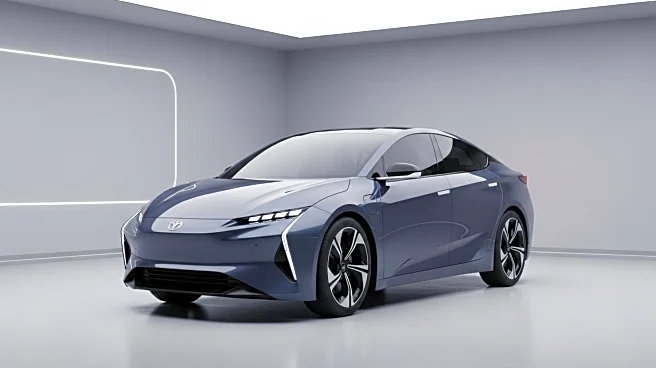What's Happening?
Ford Motor Co. CEO Jim Farley has announced a strategic pivot towards hybrid vehicles as the federal tax credit for electric vehicles (EVs) expires. Speaking at the Ford Pro Accelerate summit in Detroit, Farley highlighted the anticipated decline in EV sales due to the expiration of the tax credit, which provided up to $7,500 for new EVs. Farley emphasized that while EVs are efficient and fast, their high cost remains a barrier for many consumers. As a result, Ford plans to focus on hybrids and plug-in hybrids, which have shown increasing consumer interest. The company aims to shift production plans to accommodate this demand, leveraging its skilled workforce in what Farley terms the 'Essential Economy.'
Why It's Important?
The shift towards hybrid vehicles could have significant implications for the automotive industry and consumers. With the expiration of the EV tax credit, the affordability of electric vehicles is expected to decrease, potentially slowing the adoption of fully electric cars. Ford's focus on hybrids may offer a more accessible alternative for consumers, maintaining momentum in the transition to more sustainable vehicle options. This strategy could also influence other automakers to reassess their EV strategies, impacting the broader market dynamics. Additionally, Ford's emphasis on vocational training and skilled trades highlights the importance of workforce development in supporting this transition.
What's Next?
Ford plans to continue working with government and community leaders to enhance vocational training and attract more individuals to skilled trades. This effort is crucial for supporting the production shift towards hybrids and ensuring the company can meet future demand. The company is also navigating policy challenges, including tariffs and environmental regulations, which could impact its profitability and market position. As Ford adapts to these changes, it will be important to monitor how these strategies affect its market share and financial performance.
Beyond the Headlines
Ford's strategic pivot underscores a broader industry trend towards balancing innovation with consumer affordability. The company's focus on hybrids reflects a pragmatic approach to electrification, acknowledging current market limitations while preparing for future advancements. This development also raises questions about the role of government incentives in shaping consumer behavior and industry priorities. As the automotive landscape evolves, the interplay between policy, technology, and consumer preferences will continue to shape the future of transportation.










